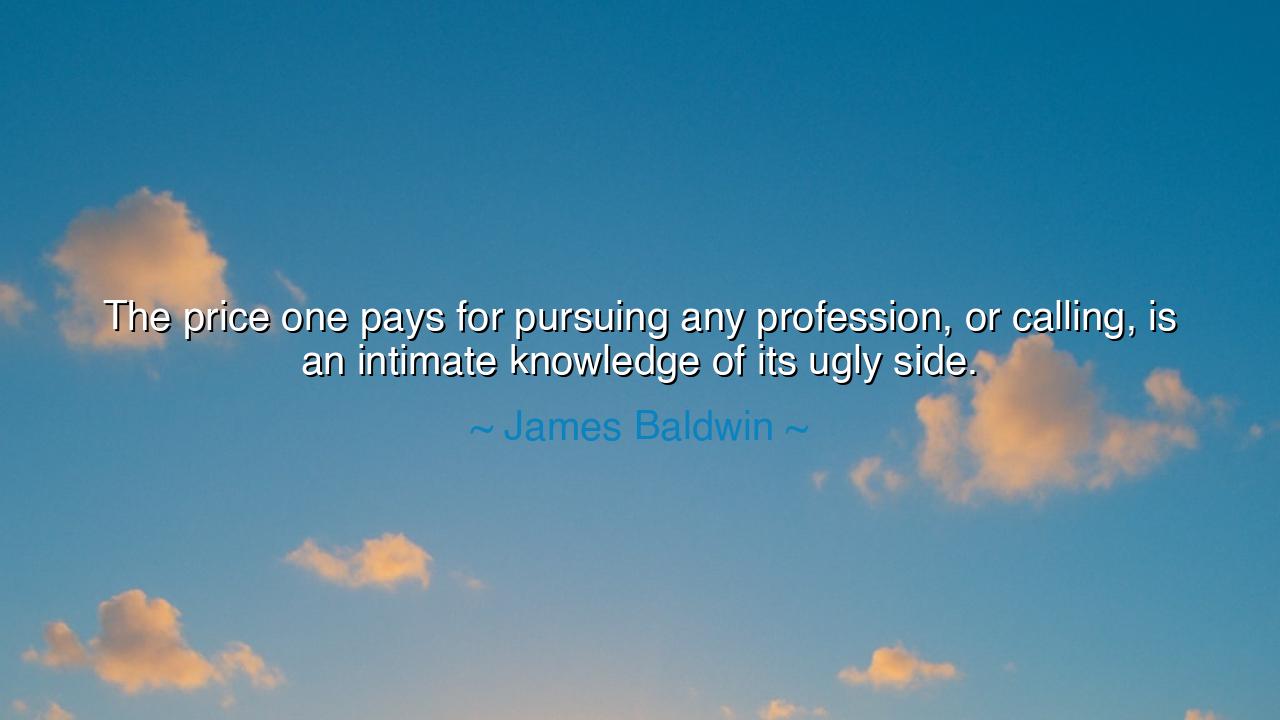
The price one pays for pursuing any profession, or calling, is an
The price one pays for pursuing any profession, or calling, is an intimate knowledge of its ugly side.






“The price one pays for pursuing any profession, or calling, is an intimate knowledge of its ugly side.” — James Baldwin
In this piercing and timeless reflection, James Baldwin, the seer of truth and the voice of conscience, reveals the cost that comes with devotion — the cost of seeing too clearly. To pursue a profession or a calling, to dedicate oneself wholly to a craft or a cause, is to walk not only into its light but into its shadow. For every noble pursuit conceals within it the scars of its making: the hypocrisy beneath the ideal, the fatigue behind the success, the corruption beside the creation. Baldwin’s words remind us that mastery and understanding cannot be separated from the pain of disillusionment. To love deeply — one’s art, one’s work, one’s purpose — is to see it naked, flawed, and human.
This truth was born from Baldwin’s own life, forged in fire and reflection. As a writer, he had glimpsed both the beauty and the burden of his vocation. He saw that to write truthfully is to wrestle with suffering — one’s own and the world’s. In America’s racial struggle, Baldwin stood as both witness and prophet, revealing the hypocrisy of a nation that spoke of liberty but lived in bondage to hate. He knew that every profession, no matter how exalted — the artist, the preacher, the teacher, the politician — carried within it a hidden darkness: pride, greed, compromise, or despair. And yet, he did not turn away. For he understood that to know the ugly side is not to lose faith, but to achieve wisdom.
History offers us countless mirrors of Baldwin’s truth. Consider the great physician Ignaz Semmelweis, who in the 19th century discovered that doctors were spreading disease by failing to wash their hands. His revelation, born of compassion, brought him scorn instead of gratitude. The ugly side of medicine revealed itself — arrogance, tradition, and the blindness of authority. Semmelweis paid dearly for his truth; yet his suffering became the seed of modern hygiene and the saving of countless lives. So too, every healer, every artist, every thinker who dares to lift the veil discovers that the pursuit of good inevitably exposes the rot that festers beneath the surface.
The ugly side of one’s calling is not merely what the world shows — it is what it awakens within the soul. The artist learns that inspiration is inseparable from doubt; the teacher learns that knowledge alone cannot reach a closed heart; the leader learns that every decision births both loyalty and betrayal. This is the price of intimacy with one’s work: that one comes to see its limits, its hypocrisies, its tragic imperfections. Yet this very knowledge, painful though it is, becomes the crucible of wisdom. For only he who has seen the shadows can truly appreciate the light.
In Baldwin’s vision, this truth was not one of despair but of liberation. To see the ugly side is to lose innocence, yes, but it is also to gain depth. The blind devotee is fragile, for his faith is built upon illusion. But the wise devotee — the one who knows the failings of his craft or cause — stands unshaken, for his faith has passed through fire. The true writer, teacher, or leader does not abandon his calling when he discovers its flaws; he refines it, reforms it, and redeems it with integrity. Thus, knowledge of the ugly side is not the death of devotion — it is its rebirth into maturity.
So, what does Baldwin teach us? That the price of greatness is not fame or labor, but honest vision. To pursue one’s calling sincerely is to open one’s eyes to all of it — the glory and the grime. The one who pretends not to see its darkness becomes a hypocrite; the one who despairs at it becomes a cynic. But the one who faces it with courage becomes a master — for he knows that truth, even when painful, purifies. The artist who understands the corruption of art still creates; the teacher who sees the futility of teaching still plants seeds; the doctor who faces death still heals.
Therefore, dear seeker, if you would pursue a calling, prepare your heart for both beauty and bitterness. Do not worship your profession blindly, nor curse it when you find its flaws. Instead, strive to know it wholly — to understand both its heaven and its hell. Let your love for it be not naive but steadfast, forged in truth. For only when you have faced the ugly side of what you love, and still choose to serve it, do you rise from being a mere practitioner to a guardian of wisdom.
And remember Baldwin’s warning, spoken with both pain and pride: that the deeper your commitment, the deeper your disillusionment — but also, the deeper your understanding. To know the ugly side of your calling is to stand within its truth, and to stand there — unbroken, unafraid, and still devoted — is the mark not of the ordinary worker, but of the awakened soul.






AAdministratorAdministrator
Welcome, honored guests. Please leave a comment, we will respond soon